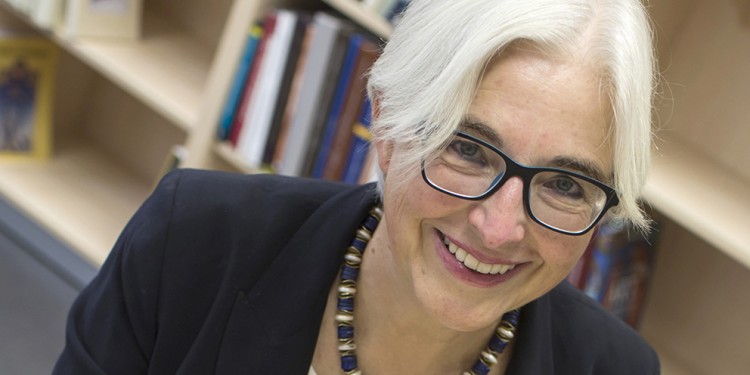
"I want to show Jewish culture in all its richness"
What would a scholarly network with a focus on “Religion and Politics” be without Jewish Studies? With the Jewish studies scholar Katrin Kogman-Appel, the WWU succeeded in 2016 in bringing one of the most internationally renowned experts in this field to Münster. As holder of a Humboldt Professorship of Jewish Studies, she enriches conversations about world religions, conversations for which the University offers ideal conditions, not least with the “Religion and Politics” Cluster of Excellence.
Kogman-Appel is in many ways a traveller between worlds. Born in 1958 in Vienna, she began studying history there in 1977. At first, Jewish Studies was only her subsidiary subject. Her interest in Jewish history and culture was initially determined by contemporary history. It was the era of Willy Brandt in Germany, and of Bruno Kreisky in Austria. The “Third Reich” was the subject of debate in both countries, and also in Kogman-Appel’s family. “I assumed it was natural for Austrians and Germans to concern themselves with the Nazis and the annihilation of European Judaism”, she says. “Perhaps that was somewhat idealistic.”
But from the present day and the recent past, the young historian soon leapt into a much earlier epoch. Her future dissertation supervisor, Kurt Schubert, pioneer and doyen of Jewish Studies in Austria, awakened her interest in Jewish illuminated manuscripts. “Anyone who studied with Schubert could scarcely avoid them”, says Kogman-Appel and chuckles. “But I also found medieval book culture so appealing because I always liked dealing with ‘tangible’ things from the past. Old things have never daunted me; on the contrary: the older they were, the more fascinating.”
With a research grant in hand, Kogman-Appel went to Jerusalem and “got stuck there”. Israel became central in her life privately, too. She met her husband, started a family, and converted to Judaism. “But our family is non-practising”, says Kogman-Appel. To her, being Jewish means solidarity with her family, with Israel and its people. Kogman-Appel certainly sees herself as its advocate, even if she is not politically active in the narrow sense. Above and beyond a “lachrymose” historiography that views Jewish life primarily from the perspective of oppression and persecution, she wants to present Jewish culture in all its richness. This is a kind of “mission” in her teaching, too. She is establishing in Münster the cultural-historical programme in “Jewish Studies”.
Kogman-Appel spends her semester breaks in Israel. And she tries to fly home for a weekend every three or four weeks – to her husband and her three grown-up children. Just how deeply Kogman-Appel has become acculturated to her new homeland is shown sometimes in passing. Such as in language. Asked about how the study of medieval manuscripts fits into the “Religion and Politics” Cluster of Excellence, for example, she refers to the increasing importance of sociological perspectives in Book Studies. Book culture has a role in shaping opinions in society, she explains: “We don’t just look at ... how do you say in German? ... ‘watermarks’”. Wasserzeichen – that’s right.
Her current research focuses on a work by the Jewish scribe Elisha ben Abraham Cresques (1325–1387), who held a privileged position as a cartographer at the royal Court of Aragon. He compiled a personal collection of religious texts. Kogman-Appel refers to the manuscript as a “windfall” – due to its rare private character and the author’s delight in communicating. Another scribe, Joel ben Simeon, active in Germany and Italy in the fifteenth century, lived in a period of transition – from the manuscript produced individually according to the needs of the person who commissioned it, to the beginnings of serial production, but still before the invention of book printing. “There was something in the air.” Like today. In the age of transition from analogue to digital culture, from book to e-book, Kogman-Appel is not only a traveller, but also a mediator, between spheres that are distant, and yet, after all, so close.
